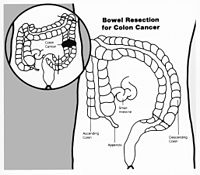
Photo from wikipedia
The study examined whether urgency of surgical intervention affects postoperative outcomes in patients with Crohn’s disease (CD) undergoing bowel resection. The review was conducted according to a predefined, published study… Click to show full abstract
The study examined whether urgency of surgical intervention affects postoperative outcomes in patients with Crohn’s disease (CD) undergoing bowel resection. The review was conducted according to a predefined, published study protocol in Prospero which is an international database of prospectively registered systematic reviews in health. The study reported according to PRIMSMA guidelines. We searched Embase and Pubmed for articles reporting postoperative outcome after urgent and elective surgery in patients with CD undergoing bowel resection. Primary outcome variable was 30-day overall postoperative complications while secondary outcome variables were intraabdominal septic complications (IASCs), mortality, reoperation, and readmission. Assessment of bias was performed using Newcastle-Ottawa score. Two authors independently extracted data on each study, patients, and outcome measures. The search identified 22 studies in which 955 patients underwent urgent surgeries while 6518 patients underwent elective surgeries. Based on the quality assessment, 19 studies were classified as having high risk of bias, one study as having a medium risk of bias and 2 studies as having low risk of bias (≥ 8 stars). Random-effect metaanalysis showed urgent surgery was associated with ~ 40% increase in overall complications compared to elective surgery (RR = 1.43, 95% CI [1.09; 1.87], p = 0.010). IASCs also increased in patients who had urgent surgery (RR = 1.44, 95% CI [1.08; 1.92], p = 0.013). No significant difference was shown in mortality and readmission rates. Urgent bowel resection in patients with CD is associated with higher risk of overall postoperative complications and IASCs.
Journal Title: International Journal of Colorectal Disease
Year Published: 2020
Link to full text (if available)
Share on Social Media: Sign Up to like & get
recommendations!